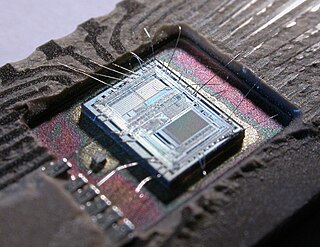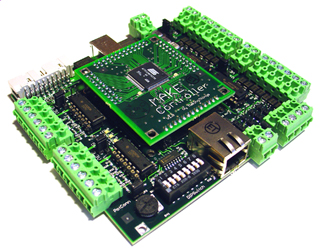
A microcontroller or microcontroller unit (MCU) is a small computer on a single integrated circuit. A microcontroller contains one or more CPUs along with memory and programmable input/output peripherals. Program memory in the form of ferroelectric RAM, NOR flash or OTP ROM is also often included on chip, as well as a small amount of RAM. Microcontrollers are designed for embedded applications, in contrast to the microprocessors used in personal computers or other general purpose applications consisting of various discrete chips.
In computer programming, an infinite loop is a sequence of instructions that, as written, will continue endlessly, unless an external intervention occurs, such as turning off power via a switch or pulling a plug. It may be intentional.
In computer science, control flow is the order in which individual statements, instructions or function calls of an imperative program are executed or evaluated. The emphasis on explicit control flow distinguishes an imperative programming language from a declarative programming language.

An embedded system is a computer system—a combination of a computer processor, computer memory, and input/output peripheral devices—that has a dedicated function within a larger mechanical or electronic system. It is embedded as part of a complete device often including electrical or electronic hardware and mechanical parts. Because an embedded system typically controls physical operations of the machine that it is embedded within, it often has real-time computing constraints. Embedded systems control many devices in common use. In 2009, it was estimated that ninety-eight percent of all microprocessors manufactured were used in embedded systems.

AVR is a family of microcontrollers developed since 1996 by Atmel, acquired by Microchip Technology in 2016. These are modified Harvard architecture 8-bit RISC single-chip microcontrollers. AVR was one of the first microcontroller families to use on-chip flash memory for program storage, as opposed to one-time programmable ROM, EPROM, or EEPROM used by other microcontrollers at the time.
Atmel Corporation was a creator and manufacturer of semiconductors before being subsumed by Microchip Technology in 2016. Atmel was founded in 1984. The company focused on embedded systems built around microcontrollers. Its products included microcontrollers radio-frequency (RF) devices including Wi-Fi, EEPROM, and flash memory devices, symmetric and asymmetric security chips, touch sensors and controllers, and application-specific products. Atmel supplies its devices as standard products, application-specific integrated circuits (ASICs), or application-specific standard product (ASSPs) depending on the requirements of its customers.
Pirate decryption is the decryption, or decoding, of pay TV or pay radio signals without permission from the original broadcaster. The term "pirate" is used in the sense of copyright infringement. The MPAA and other groups which lobby in favour of intellectual property regulations have labelled such decryption as "signal theft" even though there is no direct tangible loss on the part of the original broadcaster, arguing that losing out on a potential chance to profit from a consumer's subscription fees counts as a loss of actual profit.
In mathematics and computer science, Zeno machines are a hypothetical computational model related to Turing machines that are capable of carrying out computations involving a countably infinite number of algorithmic steps. These machines are ruled out in most models of computation.
A barrel processor is a CPU that switches between threads of execution on every cycle. This CPU design technique is also known as "interleaved" or "fine-grained" temporal multithreading. Unlike simultaneous multithreading in modern superscalar architectures, it generally does not allow execution of multiple instructions in one cycle.
PBASIC is a microcontroller-based version of BASIC created by Parallax, Inc. in 1992.

A secure access module or secure application module (SAM) is a piece of cryptographic hardware typically used by smart card card readers to perform mutual key authentication. SAMs can be used to manage access in a variety of contexts, such as public transport fare collection and point of sale devices.

BIG TRAK / bigtrak is a programmable toy electric vehicle created by Milton Bradley in 1979, resembling a futuristic Sci-Fi tank / utility vehicle, possibly for use on the Moon or a Planetoid style environment. The original Big Trak was a six-wheeled tank with a front-mounted blue "photon beam" headlamp, and a keypad on top. The toy could remember up to 16 commands, which it then executed in sequence. There also was an optional cargo trailer accessory, with the UK version being white to match its colour scheme; once hooked to the Bigtrak, this trailer could be programmed to dump its payload.

PSoC is a family of microcontroller integrated circuits by Cypress Semiconductor. These chips include a CPU core and mixed-signal arrays of configurable integrated analog and digital peripherals.
Microchip Technology Incorporated is a publicly listed American corporation that manufactures microcontroller, mixed-signal, analog, and Flash-IP integrated circuits. Its products include microcontrollers, Serial EEPROM devices, Serial SRAM devices, embedded security devices, radio frequency (RF) devices, thermal, power and battery management analog devices, as well as linear, interface and wireless products.
A contactless smart card is a contactless credential whose dimensions are credit card size. Its embedded integrated circuits can store data and communicate with a terminal via NFC. Commonplace uses include transit tickets, bank cards and passports.

Arduino is an Italian open-source hardware and software company, project, and user community that designs and manufactures single-board microcontrollers and microcontroller kits for building digital devices. Its hardware products are licensed under a CC BY-SA license, while the software is licensed under the GNU Lesser General Public License (LGPL) or the GNU General Public License (GPL), permitting the manufacture of Arduino boards and software distribution by anyone. Arduino boards are available commercially from the official website or through authorized distributors.

Holtek Semiconductor is a Taiwan-based semiconductor design centre and provider with its headquarters and design operations based in the Hsinchu Science Park in Taiwan, and has sales offices located the United States and India. Holtek's design focus is in both 32-bit and 8-bit along with Touch microcontroller development, and as of 2022 the firm employed 631 employees. Holtek also designs and provides peripheral semiconductor products such as remote control, telecommunication, power management, computer peripheral, and memory devices. Holtek's device application area is concentrated in the consumer product field such as household appliances, computer peripheral products, remote controllers, leisure products, medical equipment as well as industrial controllers. Holtek microcontrollers are in home appliances including brands such as Philips, Siemens, Märklin and Japanese brands such as Futaba and Sony.

A single-board microcontroller is a microcontroller built onto a single printed circuit board. This board provides all of the circuitry necessary for a useful control task: a microprocessor, I/O circuits, a clock generator, RAM, stored program memory and any necessary support ICs. The intention is that the board is immediately useful to an application developer, without requiring them to spend time and effort to develop controller hardware.

Turbo51 is a compiler for the programming language Pascal, for the Intel MCS-51 (8051) family of microcontrollers. It features Borland Turbo Pascal 7 syntax, support for inline assembly code, source-level debugging, and optimizations, among others. The compiler is written in Object Pascal and produced with Delphi.
MicroPython is a software implementation of a programming language largely compatible with Python 3, written in C, that is optimized to run on a microcontroller.







